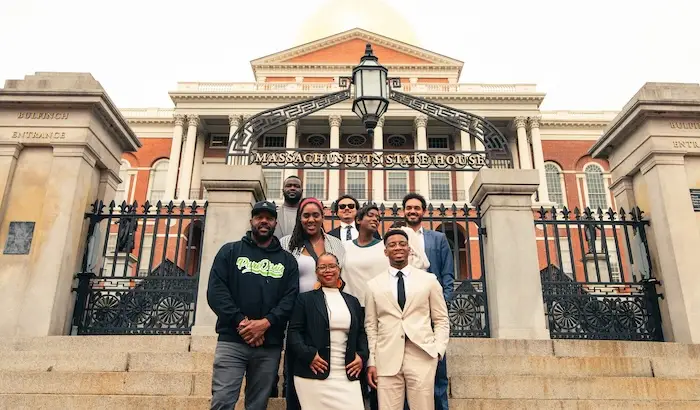
From plummeting prices to regulator wrangles and alleged retaliation, this was the year of growing pains along with strains
It was one heck of a year to launch a new site that covers weed in the commonwealth. Though it is only one of several dozen states with some kind of green action in play, Mass is often at the center of national attention—especially in 2023.
Some of that luster comes from it being the first market on the East Coast, as well as from the rush of companies looking to set up shop here. But over the past year, a lot of heads have also swiveled toward the Bay State to witness the circus that has often been the Cannabis Control Commission.
It hasn’t all been bad, as there were certainly wins in the regulatory realm as well as in sales. By one metric, adult-use Marijuana Establishments in Mass reached a “milestone by surpassing $5 billion in gross sales on Aug. 31.” But in good times and bad ones alike, it was a rollercoaster ride.
From where we were sitting, which is typically the front row, these were the towering stories of 2023—month by month—from milestones to stumbling blocks.
January – The Cashless Scare Continues
In December 2022, processors of cashless ATM transactions whose clients served dispensaries across the country started blocking use of their services from the industry, leading to a scare that bled into the new year. For months, several shops went cash only, hurting their bottom line in many cases. In time, most wound up finding some other loophole or workaround to use until the next scare (or some ease in federal banking laws) comes along.
February – The Beginning Of The Bottom
As MassLive asked at the end of February: “Is the Massachusetts marijuana market bottoming out?” It was around this time, with the retail price of an ounce falling to around $225 (more than $150 less than a year prior), that businesses began to hurt out loud. The media echoed their woes, and loudly, signaling an end to the industry’s post-COVID honeymoon.
March – Records And Russians
In a harbinger of craziness to come, the Massachusetts Cannabis Control Commission bungled a public records request made by journalists Eric Casey and Grant Smith Ellis. Months of drama ensued that involved the state’s investigation into major operator Curaleaf’s ties to a Russian oligarch (Mass regulators cleared the company months later).
April – Jabs And Labs
The Framingham-based MCR Labs accused CCC staff of “harassment” and “intimidation” during an unannounced inspection of their facility in March. MCR CEO and Founder Michael Kahn wrote in a public letter: “I was critical of the commission’s approach to regulating independent testing laboratories during my presentation at NECANN on March 10th … The type of inspection that MCR underwent was not a constructive response.” Meanwhile, the agency’s handling of the announcement of a recall of faulty test kits spurred another company to threaten possible legal action.
May – The Road To Consumption
Taking their first big step forward on social consumption, commissioners voted to scrap an ill-conceived pilot program in order to “eliminate [an] additional step that lengthens the timelines of the regulation process.” In its place, the CCC installed a universal framework for all applicants in any municipality that decides to “opt into social consumption license types, either through a ballot question or ordinance” after those types are established by regulators in the future.
June – The Big Leave
In what was probably the biggest news in Massachusetts cannabis since podcaster Mike Crawford of the Young Jurks broke the story in 2022 that 27-year-old employee Lorna McMurrey died after going into cardiac arrest at the Trulieve cultivation in Holyoke, the embattled multistate operator announced plans to “wind down its operations in Massachusetts” by closing dispensaries in Framingham, Northampton, and Worcester by June 30 and ceasing all Mass operations by the end of 2023.
July – Calls For Reform
Though just a routine hearing of the Joint Committee On Cannabis Policy, testimonies at the State House reverberated loudly as a result of allegations leveled against CCC members, with the story appearing in several local as well as national outlets. Among other proposals, the chorus came out to support a bill to establish an internal special audit unit within the CCC to “monitor the quality, efficiency and integrity of the commission’s operations, including but not limited to, operations … host community agreements, investigation and audit policies and procedures, organizational structure and management functions and seek to prevent, detect and correct fraud, waste and abuse in the expenditure of public funds.”
August – Host Community Agreements
Amidst seemingly nonstop bad press, the CCC exited July by approving “historic changes to Massachusetts’ adult and medical use of marijuana regulations that aim to level the playing field for entrants into the Commonwealth’s legal industry, increase access for small businesses and those from communities that have been disproportionately harmed by marijuana prohibition, and ensure compliance with the state law.” Revisions included “new parameters for the local contracts that host cities and towns must enter with Marijuana Establishments and Medical Marijuana Treatment Centers to site such facilities, otherwise known as HCAs, and local policies that communities must implement to comply with the state’s mandate to ensure equity in Massachusetts’ regulated marketplace.”
September – The Suspension
Following a number of contentious commission meetings, CCC Chair Shannon O’Brien was suspended for vague reasons by appointing state Treasurer Deb Goldberg. The action initiated a chain of lawsuits, accusations, and revelations that will continue into 2024, with reverberations that could echo long past just the next few months.
October – Fee Fight
The issue of the enforceability of “Community Impact Fees,” which have led to much consternation in the industry for years, bubbled closer to the surface throughout 2023, but in the wake of the CCC rewriting HCA rules—and amidst multiple lawsuits by operators against their host communities, like one filed by Berkshire Roots to recoup $440,000 in Community Impact Fees it paid to Pittsfield—these intersecting topics were starting to haunt cities and towns by Halloween.
November – The Resignation
After months of uncertainty, CCC Executive Director Shawn Collins resigned from his position. Meanwhile, the Lorna McMurrey tragedy was thrust back into full view and with a new detailed lens, after the Massachusetts Department of Public Health released a report titled “Cannabis Flower Technician Experiences Fatal Asthma Exacerbation.” Though it didn’t mention McMurrey or Trulieve by name, it’s clear the former was the subject who “became short of breath and ultimately stopped breathing and lost consciousness.”
December – The CCC Delivers
After years of Delivery Operators pleading with state regulators to make slight adjustments in the law that could help businesses with licenses to drop weed off more profitable, commissioners finally came through, advancing multiple changes including an elimination of the burdensome and costly “two-driver” rule.
























